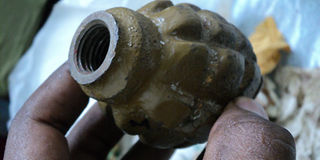Smuggled grenades Kenya's new security threat

One of the four grenades bought by the Nation reporters. The pin is removed for safe transportation. Photo/ALPHONCE SHIUNDU
What you need to know:
Hand grenades are being smuggled in from Somalia and sold to criminals and extremists for as a little as Sh4,000.
The bombs are exported by the Al Shabaab terror group, partly for profit but also to forment what it calls a Holy war in the region.
The Daily Nation, using contacts in Al Shabaab, was able to get access to the deadly weapons.
It all began one morning when a contact made an unbelievable offer to help smuggle hand grenades from Somalia to Kenya. That was on December 27, 2010.
Soon after, a colleague and I were on a plane to Mombasa from Nairobi’s Jomo Kenyatta International Airport. An hour later, we landed in the coastal city where our contact was waiting in a hired vehicle.
We were introduced to an al- Shabaab operative who demanded $300 (Sh24,000), for the grenades but somehow during the conversion the amount came to Sh28,000.
The contact then called somebody else with the message: “You can go ahead and tell your people in Ras Kiamboni (The arms smuggling centre in Somalia) to pack the cargo.”
We then got into the car and drove to Malindi, arriving at midnight and booking a hotel room. The following morning we hit the road for Lamu, 260 km from Malindi.
We observed seven police roadblocks at Sabaki bridge, Kanagoni, Minjila, Idsowe, Gamba, Witu and finally at Mokowe.
All cars were stopped for inspection — a peep into the vehicle, then the boot, a request for the driving licence and soon after a quick goodbye.
At the Witu roadblock, we spotted a plainclothes police officer, who we later learnt was attached to the Anti-Terrorism Police Unit.
His job, we were told, was to monitor residents in the small town that, for three years after the August 1998 US Embassy bombing, was home to one of the bombers - Mohammed Saddiq Odeh.
After the bombing, Odeh settled in Witu and opened a furniture shop. Were it not for a 2001 trip to Pakistan, he could still be enjoying freedom at Witu instead of a life sentence in a US maximum prison.
We reached Mokowe at noon and hired a boat for the 10-minute sail to Lamu Island where we checked into a hotel and began the wait for the middleman to deliver the cargo.
The initial plan was to take a boat into Somalia and disguised as United Nations staff, make the purchase and return to Kenya. But with stories of al-Shabaab fighters slaughtering journalists, we decided it was too risky.
We were also not sure how we would explain ourselves if arrested by the Kenya Navy, police or US Navy patrolling the Indian Ocean, so we decided it was safer to go to Kiunga, the coastal border town with Somalia, and wait for our cargo there.
But our contact said we stuck out like sore thumbs in our jeans and T-shirts, quite distinct from the kikoi-clad locals. He suggested we wait in Lamu, where we could blend in as upcountry tourists.
When our contact finally called, it was not good news. “The navy was very vigilant at Kiunga and so the guys with your cargo had to go to Mdoa (back to Somalia) with it. But I’ve arranged with another boat captain to have it delivered,” he said.
Meanwhile, the middleman had gone incommunicado and stopped taking our calls. He later said he suspected we were trying to set him up.
On New Year’s Eve, the contact had good news: the boat had left Ras Kiamboni. But the middleman had again gone AWOL and I called the contact. “He’s the best around here, be patient,” the contact assured us.
When the middleman finally showed up, he said the boat did not have enough fuel to sail back. “They should have enough by tomorrow night,” the middleman said.
Meanwhile, we were buying him airtime to make the calls to Somalia. My colleague felt we should cut our losses and run.
The middleman left Lamu a week later for Kismayu where he got the grenades and then went to Mdoa to make arrangements for his journey to Kenya.
After 36 harrowing days of phone calls, meetings and trying not to attract the attention of the Anti-Terror Police Unit, we finally had our four F1 hand grenades.
With trembling hands, I held the four small “mangoes”, being very careful not to drop them.



